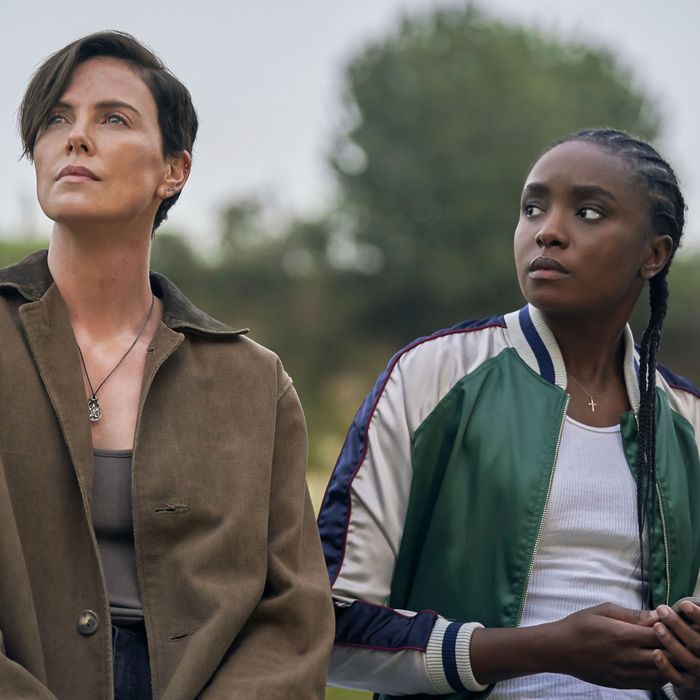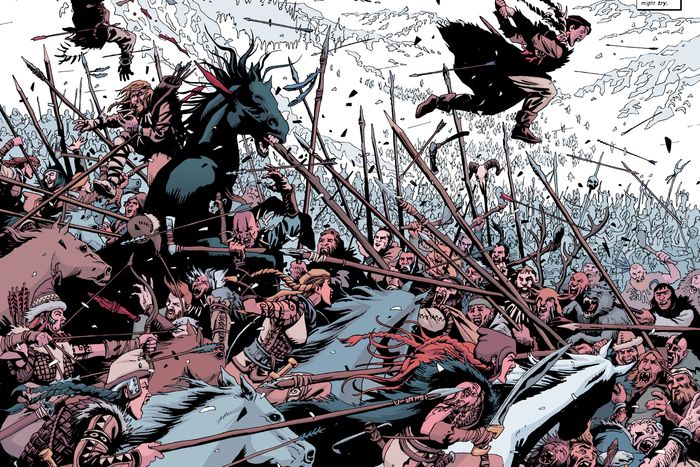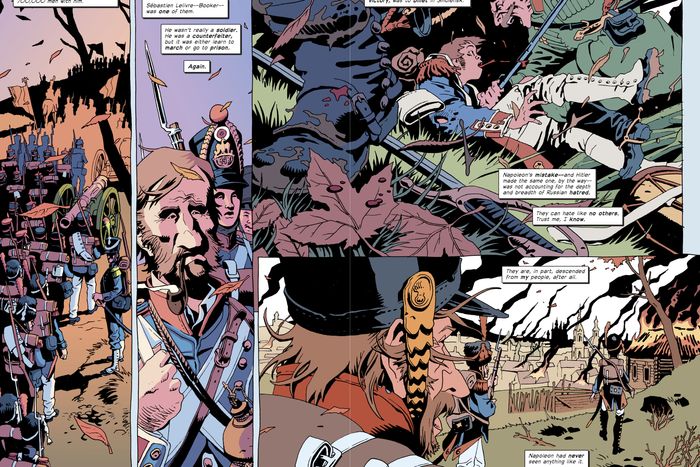
For over 20 years, Greg Rucka has been responsible for some of the most thrilling and politically conscious series in comic books. His work often focuses on people in public-service positions — police officers, government agents, military personnel — exploring these occupations through a fantastic genre lens, whether it’s the superheroics of Batwoman, the horror of Black Magick, or the action sci-fi of Lazarus. In 2017, Rucka created The Old Guard with artist Leandro Fernández, diving deep into military history with the story of five immortal soldiers trying to survive in a modern world of surveillance that threatens their secret existence. The Old Guard’s film adaptation, written by Rucka and directed by Gina Prince-Bythewood, hit Netflix this past weekend, and Vulture spoke to him about the intersection of superheroes and the military and how the film subverts genre expectations.
Where did your interest in the military come from?
I don’t think I’ve actually ever thought of myself as having a particular interest in the military, per se. I think I have a fascination with subcultures. Not just military — you get it in me writing about cops, in me writing about spies. It’s these pseudo-hidden sort of cultures that are not entirely opaque but outside my day-to-day experience. And they are communities and cultures that I have brushed up against frequently throughout my life.
I grew up with the training grounds for the Seventh Light Infantry Division literally in my backyard. And so the community that I was in and a lot of people that I knew were involved or related to either the military or intelligence communities in ways that I don’t think I was absolutely cognizant of until much later. My younger brother tells stories of his soccer team being coached by Special Forces guys who would disappear for months and months at a time and then reappear. And only years after the fact, you’d find out they’d been deployed on drug interdiction or whatnot in Central and South America for the times that they were gone.
As I’ve grown older, there certainly was a period where I was very interested in the idea of service. Of entering into these professions that are in the most part thankless, in the most part heavily glamorized in fiction and yet are not in fact truly glamorous at all.
Most epic heroes are rooted in war — Gilgamesh, Achilles — and it doesn’t seem like American pop culture really had that until superheroes came around. And then superheroes show up, and the first thing they do is go to war. What do you think made U.S. culture at that time ripe for this new type of mythical hero?
The nature of the cultural mythology certainly comes out of the immigrant experience of the country. When we talk about American mythology, we are talking specifically about the colonial mythology that we have created, and not the mythology of the indigenous people that were displaced. We have moments of military history in this country, but we don’t have a whole lot of moments where we can — certainly prior to WWII — point to a single heroic battle that turns the tide outside of really the Revolutionary War. And even in the Revolutionary War, we talk about crossing the Delaware, we talk about the Battle of Yorktown. We don’t talk about Gowanus Heights, for instance. So I think that lack of that particular kind of hero got filled at an appropriate time, culturally, where there was a need for those stories and for that kind of heroism.
There are liberal-arts professors that you want to talk to that would be able to give you a more definitive answer. But my gut feeling is that most of the stories that we have of war and warfare prior to the emergence of superheroes are somewhat subversive and revisionist. Stephen Crane’s Red Badge of Courage is an antiwar novel. Right? That we sort of come out of the gate on it saying, Hey, [war] ain’t all that it’s cracked up to be. That people die. That there is suffering, and there is pain, and it is on both sides of whatever the conflict may be. And that is different than what you get in a lot of British colonial literature about the charge of a light brigade and so on. There is, perhaps, in the American psyche — at the same time that this country absolutely glorifies guns and gun violence — an odd recognition that the butcher’s bill on these things is pretty big.
With the heavily militarized Marvel movies so prominent in popular culture, it really does feel like superheroes function as an extension of U.S. military power. Maybe that’s why The Old Guard is being sorted into the superhero genre right now. I never got that impression from the comic, but then watching the movie, I could feel the genre seeping into it. When I see someone spit bullets out of their flesh, my mind immediately goes to Wolverine and now I’m thinking about superheroes.
I keep seeing “superhero movie,” “superhero movie.” And I never once thought of this as a superhero movie, and I never once thought of the story as a superhero story. And I still don’t. I think that the pop culture vernacular shorthand for fantasy films of people who are “not human” has become “superhero.” And I think that the affiliation with the comic medium has made that easier. It came from a comic book, therefore it is a superhero movie. And I think that’s false. Leandro and I never once sat down and said, “We’re doing a superhero comic.” We say it in the comics. It is a “fairy tale of bullets and blood.” It is a fantasy, and not meant to be taken as anything other than that, because it is built on an inherent fantasy, which is some people will never die. And then we end up deconstructing it.
If you put the movie in front of somebody and say, “This is a superhero movie,” they are going to be sorely disappointed. We do not have nearly enough explosions, according to the Marvel testament of superhero movies. That’s not what this movie is. The effects in The Old Guard are pretty tame comparatively. The biggest effects sequence is near the end. And it’s not terribly spectacular as much as it is visceral. If you come into this going, “I am expecting what I got from The Avengers,” boy howdy. Sorry! They all have the same boring power. And we didn’t even make it so cool that they don’t feel it. We made it so it sucks that they’ve got this power.
It’s a fantasy. It has one fantasy premise from which everything else springs forth. You don’t call Lord of the Rings a superhero movie. Maybe that’s because they were novels. Which goes on to another annoyance that I have, which is the maligning of the comics industry — especially the U.S. industry — as if to say nothing else has ever happened in it, except people beating people up who can fly. [Laughs.] This is a deep, deep pool and a broad, broad tent, folks. And it’s time we started recognizing that.
In The Old Guard: Force Multiplied back matter, you write a lot about the process of making the movie, and specifically finding a stronger arc for Nile. What steps did you take to make that happen? Did you work with Gina to mine some new aspects of the character?
I did the first draft of the screenplay, and I turned it in to two people that I was working with at Skydance on the project. They brought me down to give notes, and Don [Granger] said, “You know, I love it, and it’s great and really strong. Nile has no impact on this story whatsoever.” And I kind of sat there. [Laughs.] And looked at what Leo and I had done in the comic in the first story and looked at the screenplay, and I was like, “You are 100 percent right.” Her purpose in the comic was to be the reader’s entry point into the world. But Niles’ effect on the plot is limited, if not minimal.
The second draft was the Nile draft. Let’s take a look at this young Black woman and her entry into this world and how she has to affect it, right? Not only how it affects her but how she affects it. What that exchange is and what those changes are. What does she need to grow into? Where does she need to get? And it was the second draft that got Gina in. That was the draft that Gina read, and she was like, “I want to do this.” I’d like to think Nile was maybe 85 percent of the way there in that draft, but she wasn’t all the way. So then it was a lot of talking with Gina and a lot of trying to find the right balance between Nile asserting agency in the story while maintaining Andy’s crisis.
The movie makes a pretty strong connection between military acts of aggression and the long-game humanitarian benefit. How do you feel about those connections in hero and military depictions in the media?
Fictions of violence have their place as escapist cinema. We like action. And certainly as an American audience, we’re clearly much more comfortable with that than we are with people having sex. It’s the nudity and the profanity that’s going to get you the R-rating; it’s not the shooting somebody in the face. Showing two consenting individuals demonstrating their love for one another in a physical fashion, that’s problematic for the American audience.
I like watching movies where shit blows up as much as anybody else. And I want to see the bad guys be made to pay, because I like the fiction. And we know now more than ever that it is a fiction: that there’s a moral right and wrong and that — at least dramatically — good can triumph over evil. Because we’re seeing evil triumph over good every fucking day. So give me a fiction where it’s the way I want it to be, not the way it is.
I would like to think we accomplished this in the movie. That there is a responsibility in how you depict these entertainments. We’ve got a team that we know is out there fighting and killing. And Nicky has the line, “We try to do what we think is right.” And I like that line a lot because it’s conditional. It’s not arrogant. There’s a humility to it. We try to do what we think is right. We don’t presume to know all the time, and we certainly don’t presume that we get it correctly. But we’re doing the best we can. And the other option is not do anything at all with what we’ve got.
Ultimately, it does boil down to power and responsibility. Yeah it’s Spider-Man, but it’s also just humanity. We all have power, and we’re all responsible to use it in a way that ideally would help other people instead of hurting.
That’s precisely it. You walk away from that last scene with a reaffirmation of something that we all actually know in our hearts that we rarely seem to carry forward in our days, which is that each of us has the capacity in the decisions we do to make life better for people we will never know and never meet. And one can argue that is the only purpose to a life. That one of the things that being immortal does is, it robs these people of a certain amount of agency. Because if you and I know we’re going to die, then on some level, every day when we wake up, we know we’re making a choice as to what the story of our life is, what we want it to be when we’re done. But if the story has no end, then that purpose is lost. There is no driving narrative to your life.
This is not superheroic, it’s human-heroic. That is what we are meant to do. This may collide with the action-movie tropes that one is obligated to when you’re telling a story like this. They have to fight. They’re going to have to shoot people. Things are going to have to blow up. But the movie ends with Andy being confronted by — actually, what you do has mattered and has always mattered. And has mattered in ways you could never see and could never, ever imagine. Because you can’t know.
Nile has the line, “They’re in it. They can’t see it.” And that’s true of all of us. We’re in our lives. I don’t know if the donation I made to Black Lives Matter is actually going to save a life. I don’t know if that’s going to be something that will change the world for the better in 50 years, but it may be one more drop in the bucket. There’s something very uplifting and affirming in that, especially when we are trapped in this hellish alternate reality of everything coming apart.
This interview has been edited for clarity and length.
"story" - Google News
July 13, 2020 at 10:29PM
https://ift.tt/2BYizSs
The Old Guard Is Not a Superhero Story - Vulture
"story" - Google News
https://ift.tt/2YrOfIK
https://ift.tt/2xwebYA
Bagikan Berita Ini
















0 Response to "The Old Guard Is Not a Superhero Story - Vulture"
Post a Comment